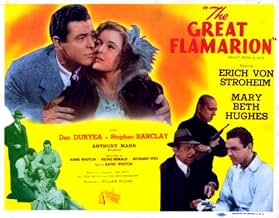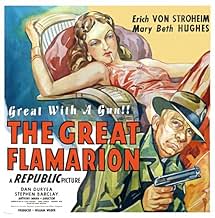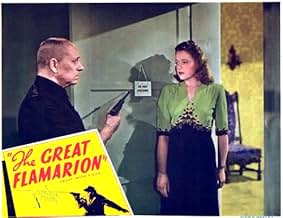IMDb RATING
6.5/10
1.6K
YOUR RATING
Part of an entertainment act, a beautiful but unscrupulous female performer manipulates all the men in her life in order to achieve her aims.Part of an entertainment act, a beautiful but unscrupulous female performer manipulates all the men in her life in order to achieve her aims.Part of an entertainment act, a beautiful but unscrupulous female performer manipulates all the men in her life in order to achieve her aims.
Erich von Stroheim
- The Great Flamarion
- (as Erich Von Stroheim)
Steve Barclay
- Eddie Wheeler
- (as Stephen Barclay)
William A. Boardway
- Audience Member
- (uncredited)
Jack Chefe
- Hotel Desk Clerk
- (uncredited)
Kay Deslys
- Sally Hampton
- (uncredited)
Alphonso DuBois
- Stagehand
- (uncredited)
John Elliott
- Theatrical Agent
- (uncredited)
Jack Evans
- Vagrant on Park Bench
- (uncredited)
Franklyn Farnum
- Stage Manager
- (uncredited)
Tony Ferrell
- Mexican Singer
- (uncredited)
Charles Fogel
- Audience Member
- (uncredited)
Joseph Granby
- Detective Ramirez
- (uncredited)
Bobbie Hale
- Pawn Shop Clerk
- (uncredited)
Featured reviews
Von Stroheim is superbly cast as a stage sharpshooter who succumbs to the charms of his scheming assistant. Though some may not appreciate the actor's ramrod-spined, Teutonic demeanor, such bearing is useful in the portrayal of stoicism and all the pitfalls that it engenders. Von Stroheim's dearth of emotionality makes all the more credible his character's inability to discern the falseness of personalities, and there is a unique poignancy in watching him go through the paces of a festering realization of perfidy. The plot, however, is pedestrian and, related in flashback, all the more predictable. Von Stroheim mavens should appreciate the movie, though, as should devotees of Dan Duryea, who plays a hard-drinking, done-wrong hoofer.
"The Great Flamarion" has an interesting setting and a good cast that give life to an otherwise routine story of love, deceit, and revenge. It is a pretty good movie, while quite obviously a low budget effort, and worth taking a look at.
The opening sequence is nicely done, and pulls the viewer in quickly. A stage variety show is interrupted by shots and screams, and soon a murder is discovered backstage. As the police question suspects, the actual murderer is seen crawling away, seriously wounded while committing the crime. The rest of the movie is then a long flashback, as told by the murderer. The rest of the film moves much more slowly, and does not match the first part, but it is pretty good.
The main performers are quite good - Erich von Stroheim as a magician fanatically devoted to his act, Mary Beth Hughes as his manipulative assistant, and Dan Duryea as Hughes's drunken husband. None of them are desirable characters, and so the audience cannot really form any sympathies, which does diminish the film's impact. But they are all convincing, and make the story seem interesting.
Overall, the positives outweigh the negatives, and this is certainly worth a look if you like older movies.
The opening sequence is nicely done, and pulls the viewer in quickly. A stage variety show is interrupted by shots and screams, and soon a murder is discovered backstage. As the police question suspects, the actual murderer is seen crawling away, seriously wounded while committing the crime. The rest of the movie is then a long flashback, as told by the murderer. The rest of the film moves much more slowly, and does not match the first part, but it is pretty good.
The main performers are quite good - Erich von Stroheim as a magician fanatically devoted to his act, Mary Beth Hughes as his manipulative assistant, and Dan Duryea as Hughes's drunken husband. None of them are desirable characters, and so the audience cannot really form any sympathies, which does diminish the film's impact. But they are all convincing, and make the story seem interesting.
Overall, the positives outweigh the negatives, and this is certainly worth a look if you like older movies.
The Great Flamarion is directed by Anthony Mann and collectively written by Anne Wigton, Heinz Herald, Richard Weil and Vicki Baum. It stars Erich von Stroheim, Mary Beth Hughes, Dan Duryea, Stephen Barclay, Lester Allen and Esther Howard. Music is by Alexander Laszlo and cinematography by James S. Brown Jr.
Back stage of a vaudeville show and a woman is killed, the perpetrator of the crime escapes up into the rafters. Soon he falls to the ground, and cradled by one of the stage employees, he tells a story of lust, deceit, murder and broken hearts...
Though it falls into a familiar subset of film noir that encompasses the obsessive dupe, reference Criss Cross, The Killers, Scarlet Street et al, Anthony Mann's film has a most interesting structure. Story is essentially told from the mouth of a dying man, his guilt set in stone, we spin to flashbacks and narration as The Great Flamarion (Stroheim) himself clues us in to the dangers of not following your brain, but what's in your underwear.
Flamarion, wonderfully essayed by the acid faced Stroheim, is a sharp-shooter on the vaudeville circuit. Once burned in love years previously, he now lives only for his work and he's friendless, miserable and intolerable to work for. His two assistants are husband and wife team Connie (Hughes) and Al (Duryea) Wallace, he's a drunk and she's out for what she can get, and what she wants at this moment in time spells trouble for Flamarion and Al. So begins a treacherous tale as a once wise and closed off man falls hook, line and sinker for a pair of shapely legs young enough to be propping up his daughter.
Connie Wallace (Hughes excellent) is one of the classic femme fatales, she's not just duping one man, not even two, her capacities for feathering her own nest are enormous. Watching her break down Flamarion's walls is pitch black stuff, as is Flamarion's pitiful descent into becoming a broken man, while Duryea's (another in his long line of great film noir losers) Al roams the edges of the frame as a pitiful drunk stumbling towards doom. The dialogue may not always catch the mood right, but as a story, performed and written, it's clinical noir.
Out of Republic Studios, there's obviously budget restrictions, but Mann was a shrewd director in noir circles and crafts a tight and crafty picture. It's never overtly expressionistic but the all round effect garnered by the lighting techniques pumps the haunting like tale with atmosphere. There's also a gentle pulse of sexual politics in the narrative, and saucy suggestion as well, with the director asking us to peek under the curtain to spy a world of horny sad-sacks and dangerous females.
It's not front line Mann or as good as Scarlet Street (released after The Great Flamarion), but it is a little noir gem. With top performances, pitch black plotting and a message that tells us to never take our eye off the ball, it's very much recommended to the film noir faithful. 8/10
Back stage of a vaudeville show and a woman is killed, the perpetrator of the crime escapes up into the rafters. Soon he falls to the ground, and cradled by one of the stage employees, he tells a story of lust, deceit, murder and broken hearts...
Though it falls into a familiar subset of film noir that encompasses the obsessive dupe, reference Criss Cross, The Killers, Scarlet Street et al, Anthony Mann's film has a most interesting structure. Story is essentially told from the mouth of a dying man, his guilt set in stone, we spin to flashbacks and narration as The Great Flamarion (Stroheim) himself clues us in to the dangers of not following your brain, but what's in your underwear.
Flamarion, wonderfully essayed by the acid faced Stroheim, is a sharp-shooter on the vaudeville circuit. Once burned in love years previously, he now lives only for his work and he's friendless, miserable and intolerable to work for. His two assistants are husband and wife team Connie (Hughes) and Al (Duryea) Wallace, he's a drunk and she's out for what she can get, and what she wants at this moment in time spells trouble for Flamarion and Al. So begins a treacherous tale as a once wise and closed off man falls hook, line and sinker for a pair of shapely legs young enough to be propping up his daughter.
Connie Wallace (Hughes excellent) is one of the classic femme fatales, she's not just duping one man, not even two, her capacities for feathering her own nest are enormous. Watching her break down Flamarion's walls is pitch black stuff, as is Flamarion's pitiful descent into becoming a broken man, while Duryea's (another in his long line of great film noir losers) Al roams the edges of the frame as a pitiful drunk stumbling towards doom. The dialogue may not always catch the mood right, but as a story, performed and written, it's clinical noir.
Out of Republic Studios, there's obviously budget restrictions, but Mann was a shrewd director in noir circles and crafts a tight and crafty picture. It's never overtly expressionistic but the all round effect garnered by the lighting techniques pumps the haunting like tale with atmosphere. There's also a gentle pulse of sexual politics in the narrative, and saucy suggestion as well, with the director asking us to peek under the curtain to spy a world of horny sad-sacks and dangerous females.
It's not front line Mann or as good as Scarlet Street (released after The Great Flamarion), but it is a little noir gem. With top performances, pitch black plotting and a message that tells us to never take our eye off the ball, it's very much recommended to the film noir faithful. 8/10
"The Great Flamarion" is an undiscovered little gem of a film from Rebublic that features von Stroheim as the title character, a cold and arrogant vaudeville performer who specializes in sharp shooting. He is assisted in his act by Connie and Al Wallace, a seemingly happy couple. When Connie professes her love for Flamarion and tells of her husband's abusive nature and hard-drinking, Flamarion eventually opens his heart to this femme-fatale, played to the hilt by Mary Beth Hughes, a most underrated actress, who toys with men in the tradition of film noir greats such as Joan Bennett in "Scarlet Street," Jane Greer in "Out of The Past," and Yvonne DeCarlo in "Criss Cross." When Connie suggests that Flamarion accidentally hit Al, portrayed by the always terrific Dan Duryea, during their gun skit, Flamarion's life changes forever. Anthony Mann's direction is taut and economic. The film, told through flashbacks, captures the desperation and loneliness of a man willing to do anything for love. Next to "Sunset Boulevard," this is one of von Stroheim's finest hours as an actor. He allows himself to show joy and vulnerability as he never has before on screen.
Despite the title suggesting a comedy Erich von Stroheim actually plays the sort of role Emil Jannings played in the twenties. In the third of a quartet of quickies to pay his medical bills after a serious illness we actually see the famous neck being shaved with a cutthroat razor before going onstage to perform the act with firearms that makes the film worth watching.
It's good to see him share the screen with a young Dan Duryea a few months before the latter clashed with Edward G. Robinson in 'Scarlet Street' in this early film directed by Anthony Mann, which shows flashes of the promise he later fulfilled.
It's good to see him share the screen with a young Dan Duryea a few months before the latter clashed with Edward G. Robinson in 'Scarlet Street' in this early film directed by Anthony Mann, which shows flashes of the promise he later fulfilled.
Did you know
- TriviaLa cible vivante (1945) marked the debut of William Wilder as a motion picture producer. Wilder, who was sometimes credited as W. Lee Wilder on his later films, was an "eastern industrialist," according to a September 1944 Hollywood Reporter news item, and was the brother of director Billy Wilder.
Billy Wilder rarely talked about his brother, and when he did the theme was always the same: "A dull son of a bitch," Billy said of him in 1975. Years later he called him "a fool" who thought he could make it in Hollywood simply because his more famous brother had.
- GoofsDuring his act, the Great Flamarion fires more shots than the gun can store.
- Quotes
Connie Wallace: You know, no matter how fast you drink it the distilleries can still stay way ahead of you.
Al Wallace: Yup. But by next week I'll have 'em workin nights to do it!
- ConnectionsEdited into Muchachada nui: Episode #2.11 (2008)
- SoundtracksChita
by Faith Watson
- How long is The Great Flamarion?Powered by Alexa
Details
- Runtime1 hour 18 minutes
- Color
- Aspect ratio
- 1.37 : 1
Contribute to this page
Suggest an edit or add missing content

































